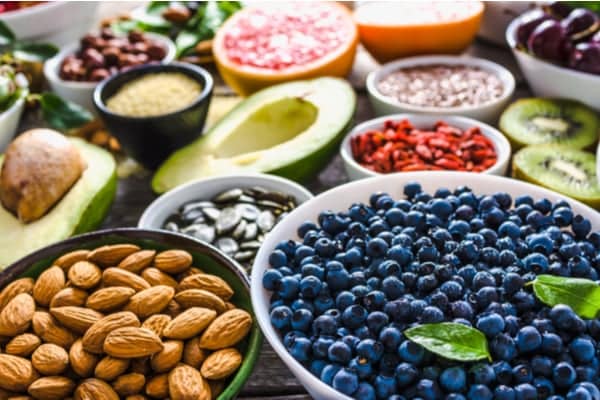This article is part of a series on Nutritional Psychology and how what we eat affects our brains and moods.
Nutritional Psychology is a relatively new field that emerged in pursuit of taking our time to examine and investigate the connections between what we eat and how we feel. Eating to maintain gut health plays a role in eating for mental health because of how nutrients affect mood and behavior. Food and digestion play major roles in the condition of our bodies and our minds.
Read on to learn more about the gut-brain connection and which foods to eat for a healthy gut.
Neurotransmitter Basics
Our brain cells use chemicals called neurotransmitters to communicate with each other. These chemicals serve a variety of different purposes in our bodies and contribute to behavioral regulation. For example, dopamine plays a role in feeling rewarded, and norepinephrine plays a role in response to stress by heightening arousal, increasing oxygen supply to the brain and increasing focus.
The neurotransmitter serotonin helps set the tone for brain activity. It plays a role in our daily rhythm because it is involved in our daily functions, such as sleeping and digesting, and it interacts with our endocrine system and influences the production of other neurotransmitters, such as melatonin. Serotonin is also a mood regulator, which is why eating to maintain healthy serotonin levels is a part of eating for mental health.
How the Brain and the Gut Are Connected
The gut includes our entire gastrointestinal (GI) tract, from where food enters at the mouth to where waste exits at the end. It serves as the interchange system through which we interact with our environment by ingesting our food. The gut is like a big port, permitting certain substances in, allowing specific actions to occur, and passing waste along.
Millions of nerve cells and microorganisms (bacteria, archaea, and eukarya) line the gut and interact with each other to influence our moods and provide other benefits. The microorganisms of our microbiota are unique to each individual and help strengthen the muscle cells of our intestinal walls, aid in digestion, and support our immune systems.
Over 90 percent of serotonin is produced in our gut, either directly from the microbiota or through an interaction between the microbiota and nerve cells. Because serotonin influences so many regulatory functions and helps regulate our moods, maintaining a happy, healthy gut is part of eating for mood regulation.
The Vagus Nerve and the Human Nervous System
Neurons are specialized cells that transmit nerve impulses in the brain and central nervous system. Neurons tell the body what to do and how to do it, and they are responsible for much of human behavior. The human brain contains somewhere around 100 billion neurons.
So what do neurons have to do with gut health? As you can assume, neurons are responsible for relaying communication between the gut and the brain. Just as well, the gut also contains nearly 500 million neurons that are connected to the brain through the nervous system. One of the most notable and large nerves that connect the gut to the brain is the vagus nerve, which sends information to and from the gut.
In numerous animal studies, it has been found that stress can deter signals that go through the vagus nerve to and from the gut, which can lead to gastrointestinal illness or pain. Human studies have also concluded that patients suffering from IBS (irritable bowel syndrome) as well as Crohn’s disease, both significant gut-related illnesses, had a reduce vagal tone. This indicates that the patients’ vagus nerve was suffering from reduced function.

Get Your Free Guide to the Top 50 Anti-Inflammatory Foods
Improving Vagus Nerve Function
Improving the function of this nerve is one way to strengthen the connection between the gut and the brain, thus possibly improving one’s mood.
- Learn how to breathe. Your respiratory system and your heart rate are closely related — they are also modulated by your vagus nerve. This could be one reason why engaging in yoga on a regular basis could be good for reducing stress. Guided breathing exercises can help lower your heart rate and blood pressure, thus increasing vagal tone.
- Spend more time in cold places. Cold can tone the vagus response and slow the activation of one’s sympathetic nervous system. Taking regular cold showers or spending some time in cold climates can reduce stress markers and even improve symptoms of depression and anxiety. Cold exposure can also activate the gastric nerves in the gut and “activate” the process of digestion.
- Improve your gut microbiomes. We’ll be covering the ins and outs of gut microbiota more later on in this article, but it’s worth noting that the vagus nerve works in tandem with microorganisms in the gut to facilitate the gut-brain connection. Enabling thriving microbiota in your gut by eating gut-friendly foods that are rich in probiotics can improve your mood and your overall health.
While there are some things one can do to improve the condition of their vagus nerve, much of the power we have to improve the gut-brain connection lies in what we eat. Nutrition is, by far, one of the most powerful ways we can improve our gut and brain health.
What to Eat – Gut-Brain Connection Diet for Better Mental Health
Food Varieties for Gut Health
Let’s look at what chemicals and ingredients make gut-healthy food so beneficial and the types of food you should stock up on to improve the connection between your gut and your mind.
Tryptophan-rich Foods
After ingestion and through interactions with gut microbiota, tryptophan is eventually turned into serotonin and other chemicals. Regularly consuming foods such as rice, soybeans, pumpkin seeds, walnuts, salmon, and dark leafy greens will ensure you are getting enough tryptophan in your diet.
Omega-3 Fatty Acids
Salmon also provides omega-3 fatty acids, which interact with gut microbiota to maintain a strong intestinal wall and increase the production of anti-inflammatory compounds. The myth seems to be that one can only find beneficial omega-3 fatty acids in fish, such as mackerel, herring, sardines, and anchovies. However, there are many vegan options for implementing omega-3 fatty acids into one’s diet. Chia seeds, walnuts, and soybeans also contain ALA omega-3 fatty acids.
Miso is one type of food that is rich in omega-3 fatty acids, mostly derived from its soybean base. A delicacy in Japan, this fermented soybean paste is loaded with gut-friendly bacteria as well as enzymes. The salty concoction is used as a base for soups, sauces, salad dressings, and marinades for tofu or fish. It’s also a great food item for vegan cooking.
Polyphenol-rich Foods
These foods are thought to regulate our gut microbiota by decreasing the bad microorganisms and increasing the good ones. Foods highest in polyphenols include cloves, star anise, cocoa powder, Mexican oregano, celery seed, dark chocolate, flaxseed meal, and chestnuts. But you can also get some by basing your diet around a variety of whole fruits and vegetables and adding in seeds and nuts. You can also drink your polyphenols in both tea and coffee.
Olive oil is one tasty food to use more often for its polyphenol-rich content. This popular cooking oil is made up of fatty acids and polyphenols that can help reduce stomach inflammation and illnesses. This oil is versatile and can be used for virtually anything, including dressing bases, frying food, or flavoring dishes.
Fiber
This material in food helps keep the contents of our gut moving along. Bacteria in our gut also ferment fiber to produce butyrate, a chemical that helps maintain brain health. A diet that includes high-fiber whole grains also helps increase our gut microbiota diversity and decreases spikes in blood sugar that can lead to irritability and unpleasant moods. Get whole grains from rye, barley, brown rice, oats, millet, and popcorn.
Kimchi is one great Korean food and is made of fermented vegetables, namely cabbage and red pepper paste. This fermented food has loads of fiber as well as lots of probiotic bacteria and vitamins — all of which make it an excellent food for improving the gut-brain connection. Many variations of kimchi are vegan, but keep an eye out for kimchi that contains anchovies or other fish flavorings.
Probiotics and Prebiotics
Probiotics increase gut microbiota diversity, and prebiotics help feed existing bacteria. Fermented foods, such as sauerkraut, kimchi, miso, tempeh, and water kefir, are all yeast or bacteria containing foods that add to your gut microbiota. Keep that microbiota strong by eating prebiotic foods, such as chicory root, raw dandelion greens, leeks, onions, garlic, asparagus, spinach, bananas, and soybeans.
Eating a diet rich in whole foods that contain fiber, tryptophan, polyphenols, and both pre- and probiotics helps keep your gut happy. And a happy, strong, healthy gut means you’ll also have more regular moods. To learn more from this series, read about your brain on food and eating for depression and anxiety.
Water kefir is one great vegan probiotic powerhouse and is a distant cousin of yogurt. It is made by fermenting water kefir grains and is loaded with very beneficial bacteria. Originally from the region between Asia and Europe, this food can be added to other foods to “hide” the taste if it isn’t your thing. Try throwing some kefir in your morning breakfast smoothie, a homemade salad dressing, or a hearty soup.
Your GI Tract & It’s Connection to Your Central Nervous System
The nervous system and the digestive system are intimately intertwined. It is because of this that you feel butterflies in your stomach when you are nervous, and why anxiety might send you to the bathroom. Read on to learn the connection between the GI tract and the central nervous system.
The Enteric Nervous System & The Gut-Brain Connection
In fact, the enteric nervous system (ENS) is often referred to as the “second brain” because it has a mind of its own. In the gut-brain axis (GBA) there is a bi-direction communication between the gut, via the enteric nervous system, and the brain, via the central nervous system. Over the past two decades, plenty of research has been conducted on the GBA, as it links the emotional and cognitive centers of the brain with peripheral intestinal functions. This is why you often feel emotions in your gut, and why indigestion can leave you feeling groggy.
More recently, however, the GBA has been extended to include the microbiome. Research on the microbiota-gut-brain-axis (MGB axis) has revealed how the gut microbiome, via metabolites, the synthesis of neurotransmitters, and other chemicals, act as an important avenue of communication.
The Gut-Brain Connection & Anxiety
Stress and anxiety have been proven to disrupt the mucosal barrier of the gut and the gut microbiome. Based on what you’ve learned so far, you know that this is bad news for your health, and is one of the mechanisms by which stress and anxiety can contribute to chronic inflammation, and chronic disease.
High anxiety levels dysregulate the immune system, including the immune cells that are housed in the gut. It may overreact when it should not, causing the development of autoimmune disease, and it may not protect your body from pathogenic viruses and bacteria. The result of both is illness.
By now, it’s likely no surprise that mental health and gut health are related. Humans and gut bacteria communicate and regulate each other in several ways.
- Psychological stress and anxiety can lead some people to crave high-fat, high-refined carbohydrate, and micronutrient-poor foods. These are the types of foods with which pathobionts thrive.
- Chronic stress and repeated bouts of distress can reshape the composition of gut bacteria through stress hormones, inflammation, and neurohormones. Together, these can alter behavior and mood.
- When the mind perceives psychosocial stress, the gut bacteria upregulate the body’s responsiveness to stress, increasing the risk for depression.
Irritable Bowel Syndrome (IBS) & Mental Health
Even though there is no specific known cause of IBS, it has long been known that IBS is associated with mental distress resulting from a disruption in the gut-brain axis. In fact, the relationship is bi-directional.
Neurotransmitters affect blood flow regulation, intestinal motility, nutrient absorption, the gastrointestinal immune system, and the microbiota. Thus, when person is experiencing mental distress, the gut is negatively affected. At the same time, dysbiosis and functional gastrointestinal disorders, such as IBS, disrupt the enteric nervous system which is located in the gut.
FAQ’s
Is There a Link Between Gut Health and Mental Health?
Yes. The Gut-Brain axis, now more commonly referred to as the Microbiota-Gut-Brain axis, is the mechanism by which the gut and the brain communicate bi-directionally by way of hormonal, neural, and immune mediators. The signals can originate in the gut, the brain, or both.
How Much Does Gut Health Contribute to Mental Health?
Unfortunately, there is no way to quantify the contribution of gut health to mental health, because it depends on each individual’s physiology combined, environmental, genetic and circumstantial factors.
However, there is no denying that, via the microbiota-gut-brain axis that disruptions in gut health and wellbeing have a negative impact on mental health.
How Can I Improve My Gut Health for Mental Health?
Improving gut health is likely to help improve mental health. You can improve your gut health by:
- Exercising regularly
- Staying hydrated
- Resting and sleeping
- Moderating stress levels
- Eating a gut-health promoting diet, which includes a diet rich in soluble fiber, fruits and vegetables, Omega-3 fats, and lean protein.
- Eating fermented food
- Consider taking a probiotic supplement
How Does Leaky Gut Affect Mental Health?
Intestinal permeability, also known as leaky gut, leads to alterations in the gut mucosa and transportation of substances across the intestinal barrier. Increased intestinal permeability leads to increased inflammation, dysbiosis, and potentially, bacterial translocation.
Via the gut-brain axis, alterations in the gut mucosa and microbiota, mental health can negatively be affected.
Can A Problems with Gut Health Cause Anxiety?
High anxiety levels dysregulate the immune system, including the immune cells that are housed in the gut. It may overreact when it should not, causing the development of autoimmune disease, and it may not protect your body from pathogenic viruses and bacteria. The result of both is illness.
Why Is The Gut Called a Second Brain?
The gut is home to the enteric nervous system, which contains up to 600 million neural cells. This system can control the gut independently of the brain.
Editor’s Note: This post was originally published June 2019 and has recently been updated and revised for accuracy and comprehensiveness.




